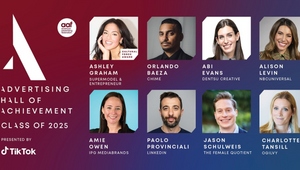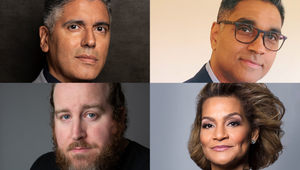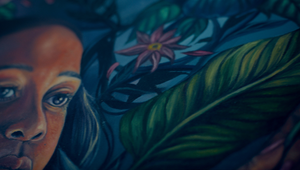
5 Minutes with… Franck Lambertz

There’s something awfully endearing about a ‘local boy done good’ story so when we found out that MPC’s multi-award winning Creative Director Franck Lambertz was returning to his home turf to set up MPC Paris, well, we couldn’t resist the chance to find out about his full-circle journey. Over the past 15 years Franck has helped create movies in Canada, has made eye-popping commercials in London (including Assassin’s Creed Black Flag spot that took home the only Gold Lion for VFX in 2014) and has set up studios in Los Angeles and Amsterdam – and in that time he’s worked with some impressive international talent. Now, though, he’s back in his native France looking to immerse himself in the ‘je ne sais pas’ of quirky, beautiful French advertising. LBB’s Laura Swinton caught up with Franck to find out more.
LBB> Why was it the right time to return to France?
FL> For me it was perfect timing and I'm couldn't be more pleased. It's been great for me to bring all the experience I've gained around the world back home to Paris
LBB> So tell me about the globe-trotting that led to this point?
FL> I first moved to Madrid, but that wasn’t really a big move. The first big one was when I moved Hybride in Canada in 2000, where I was working on movies. Around 2003 a friend of mine told me about MPC, an amazing place in London. At first I came to work in film, but my friend said, ‘no, you want to work in commercials’.
I worked in London for three years and Graham Bird [MPC’s MD of commercials] said, ‘What do you think of Los Angeles?’ I was never one of those people who had much of an American dream, but I said ‘yeah, why not.’ I moved there and it was a totally amazing experience for me to discover America and set up MPC. But I wasn’t sure that I would settle my life there permanently – it was great but too far and I missed my big family.
I moved back to London and after two years they suggested setting up in Amsterdam. Amsterdam – like Paris – is connected to London, where all the hardware and equipment is. I was curious to test the pipeline to make sure it worked. I was in Amsterdam for six months, and then moved between Amsterdam and London. I tested all the technology and it was amazing – a little boutique place of three rooms but you’re connected to the bigger machine. You have the best of both worlds – you have your little studio and you know what’s going on with a project on the ground but you have all the facilities of a big studio.
…So just to finish my tour around the world, we decided to set up a similar thing in Paris. It took us a while to find a location because we wanted it to be a really good place for clients. We found an apartment in rue d’Hauteville and made it really Parisien – white, with fireplaces, a wooden floor. So far all the clients who have come are really pleased with the set up!
LBB> And what do you think you’ll be able to bring to Paris with this international experience?
FL> We have the best people from all over the world working at MPC. One of the last projects that I worked on in London was Samsung's Coliseum spot, directed by Nathan Price. We had one compositor from Japan, 3D Lead was German and the matte painter was from Eastern Europe. There are people from everywhere and that’s a real plus, it makes it very rich. We can find a really practical way of solving a problem from the German guy and then there’s me, the crazy French guy in the middle of that creating a bit of a mess. Yosuke, who is Japanese, would comp a shot and the first time I’d see it I’d say, ‘woah, where is this going?’ it's a different approach to me, but very good. I would never composite that way but he comes from a different background and learned in a different way - that’s the beauty of working all over the world. You can bring back these lessons and different ways of working. If you think you know everything that’s such a big mistake, you have to keep learning from everyone and everywhere.
LBB> You’ve led the launch of MPC in LA and Amsterdam – what challenges were unique to the launch of MPC in Paris?
FL> Because I don’t have very good English, I was never sure if people could understand me and now I’m back home, I have no excuse!
But that being said, here in Paris we work more closely with the production companies, we don’t work for the agencies in the same way as we do in London That makes the process a bit different to how I’m used to working in London or LA. We get involved later in the process whereas when we work with the agency we are there from day one, to give them advice when they’re developing the script. We’ve had to adapt to this other way of working.
Aside from that… well, it’s French so [the industry] is very, very creative and sometimes a bit less organised (laughs) But that’s fine. The reason we’ve set up all these places around the world is because we want to be close to our clients and to understand how they work. It’s not about saying ‘oh we’re in Soho in London, come to us if you need VFX’. That’s not our spirit at all. Our spirit is to have a small studio here to look at the way people work in the local industry and adapt our workflow to suit that. I left such a long time ago, it’s been 15 years, so it’s funny that when I came back it felt like I was coming to a completely new country!
LBB> And where does MPC Paris sit within the French advertising landscape? And what are you bringing to the market that’s new or different?
FL> > Its a bit pretentious to say this, but MPC is an amazing studio and we’re all about quality and having a close relationship with the client, trying to push a project to be the very best that we can make it. I look at the work happening in Paris and I think we can bring our spirit to the market. There are a lot of luxury, beautiful commercials here.
When I look at the projects we do in London – I was lucky enough to work on Assassin’s Creed, we worked on Lacoste, Jean-Clément (Soret) has worked with so many amazing French directors - it just makes sense for us to be here.
There is also some really creative VFX work happening here and I was a little bit jealous when I saw some of the spots coming out of France. I thought, ‘well, we need to be part of that’. We’ve already done beautiful French work with Assassin’s Creed and Lacoste from London but now we’re here I think we will have the opportunity to create more.
LBB> Having launched and grown MPC offices in LA and Amsterdam, what lessons have you learned about opening a successful VFX studio in a new market?
FL> If you go to a new country and start out by thinking that you know the process, you have already failed. You have to know what you don’t know. You have to be open-minded and you can’t turn up saying, ‘we are MPC, we have nothing to prove’. No. It’s really about service, the boutique and creative process.
LBB> You won the only Gold Lion for VFX last year for the epic Assassin’s Creed Black Flag spot. What was it about the craft of the spot that pushed it over the line for the judges, do you think?
FL> That’s a difficult question! I think it’s about how all the little pieces of the project came together. It’s not just about VFX. OK, it was a big visual effects challenge but that doesn’t make a film. And when you work with a high profile director like Adam Berg it’s not just about visual effects or photography or production design. Everyone comes together: the DP Mattias Montero is amazing, there was Ben Croker, the producer, and, of course, Adam, who is a clever man with a very clear view of what he wants. Making sure all these elements come together was the challenge. If you don’t have that, you can do the best VFX work you’ve ever done and it will look like a technical challenge that nobody cares about. Everybody was on board, we had around 30 people working on it at MPC and we all said we had to give our maximum effort.
After that you just carry on in the same spirit – and Adam was eagle-eyed and on top of us all, pushing the boundaries. What I love about this sort of job and big directors like Adam is that they push you right up to your limits but they won’t push you past the scope of what you can do. . That’s one of the challenges of VFX. It’s artistic and very technical at the same time. This sort of high profile director can push you to the limit but in a clever way. They understand the process and how far you can go. They anticipate the challenges so you don’t end up in a situation where everyone is totally lost. That’s my job as well –with the VFX– but it’s about how you work with a team to make sure they give you the very best that they can without putting them in a cul-de-sac. It was hard work but we were never lost. We always knew where to go and I think you can feel it in the final film.
LBB> It was interesting to see that MPC was involved in the project very early on, creating pre-vis footage to help Adam plan out the camera movements. What difference did having that early input have later on in the process?
FL> That helps everybody, not just the VFX team. It helps everyone visualise what’s going on. We have a bit of experience when we get boards or treatments coming to us, we quickly flag the troubles that will crop up, but sometimes it’s very difficult to communicate these. Pre-vis is an amazing tool to highlight the hurdles straight away.
As you move through the production process you can show visually where we’re going. When you bring a pre-vis on set you can get everyone on board and you feel it so much. Whether it’s the rigger or a background actor, they feel much more involved in the process. You can feel the vibe of the set
LBB> You’ve worked on so many award-winning commercials over your career. Which have been your personal favourites to work on and why?
FL> I’m like you, it’s very difficult to single any out. I’m a bit like a kid. Every new project is like a new toy. Of course there are some that stay with you – you have these beautiful old toys that you keep on your shelf and you look at them and you think that they’re great. Eventually, when you’re an old man you’ll still have your little bear to bring back memories. But each toy gives you something new to look at. I can’t just pick up one! Of course I have some big ones. I was lucky enough to do the opening sequence of Sin City, which was amazing, I was lucky enough to do the DirecTV Hot House ad. But with each new project that comes you have to have fresh eyes, you can’t just sit there thinking, ‘yeah, yeah I did this, I did that’. It’s not the way it works.
LBB> How did you first get involved in VFX and the production world?
FL> I’m becoming a bit of an old guy – when I started out we didn’t have the amazing schools that we have now. Funnily enough, when I started out I was more interested in sound because I was a musician. I began doing a bit of video and sound production. One day I had an appointment at the Opera Bastille and one at Mikros (at this point Mikros was very close to the Opera Bastille).
That was a moment that could have made my life turn out very differently – I could have done sound or I could have done visual effects! The meeting at the Opera Bastille didn’t go well and I didn’t really get on with the guy there. The man at Mikros was very nice and pleasant – so I ended up doing VFX! I started out doing corporate films and I did a lot of very bad French soap opera. Little-by-little you move, you try your best, you meet people who know other people and you move through the industry like that.
That’s what I like about this job. With MPC Paris, we had to build up the team around us. It’s not about the resume and where they come from but about their spirit and whether or not they want to work hard. It’s less about what they’ve worked on before because we will grow together – it’s about whether you want to be part of our story.
LBB> Before heading to MPC you worked on a few movies with Hybride Canada – notably Sin City. Why did you decide to make transition from working in movies to commercials? And how did you find it?
FL> It’s a very interesting topic! When you work in film you feel that you’re involved in a masterpiece that will be around forever and that generations of kids will watch with their parents. There’s something fascinating about working in the movie business. My last project with Hybride was a year and a half long and I started to feel like I was part of a big machine and too far removed from the creative process. I was very much in charge of my sequence but, in a way, I couldn’t influence anything.
When I switched to commercials I had the chance to be more of a part of the creative process and to push the film where we wanted it to go. I love working in commercials and at MPC we are lucky to work on some very beautiful films. At the same time, I’m part of it. If a shot doesn’t look good, 40 per cent of that will be my fault because I didn’t anticipate the problem and I didn’t explain the problem and when I was behind my machine I didn’t manage to fix the problem.
LBB> With its blend of technology and creativity, I often think that VFX/post production is the most innovative part of the ad industry. What are your thoughts on this?
FL> We always look at what is out there and ask ourselves, ‘how can we use it and play with it and twist it and change it?’ It’s about looking around us. In a way our work is so technical and if you think you know everything then you’ll be out of business in two years. You have to open your eyes and look at new ways of creating images. What I like about my work at MPC is that it’s about how you use this amazing big infrastructure. It’s no fun when everything goes smoothly. I like twisting the system, testing new features, figuring out how we can work differently. It’s about casting a new eye on something and doing it differently. That’s where you create.
If you know how to get the result and just do the same old thing, well, it won’t be creative. Part of creativity is the mistakes that you do. That opens new doors. When I look at the way I was working in VFX 20 years ago and the way that I’m working now, it’s totally different. But I’m still having the same fun!
LBB> And are there any developments at the moment that are getting you excited? For example there are a lot of new platforms, it’s not just about creating stuff for TV anymore.
FL> The idea is the goal. Think about virtual reality and the technology that allows you to create 360 pictures. It’s great but, in some ways, I don’t care. I probably shouldn’t say that, but it doesn’t matter, it’s just a tool. If I have to create 360 pictures, fine I will find the technology and the solutions, but it’s more about how do you make this project as creative as possible for the people you work with and the audience. Come with us, tell us your story, tell us what your media will be and after that we will find solutions and look around and show you examples - the starting point should be the story and after that the technology will follow.
LBB> And rounding things up, what are your goals for MPC Paris?
FL> When I see all the amazing work in Paris, I hope that in a year we will have made a contribution to it. I hope that we will be part of these beautiful films that are happening here. It’s challenging, but there are some gorgeous images made here. We are small but I hope we will have made some lovely films in one year’s time. Fingers crossed, we are looking at some beautiful projects right now and if we are lucky we will reach this goal.















